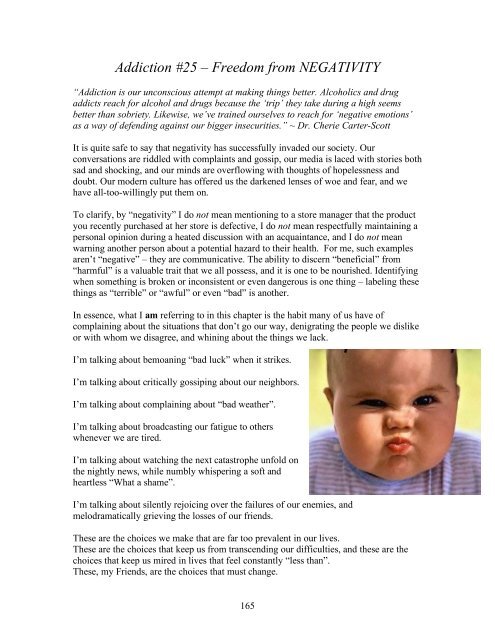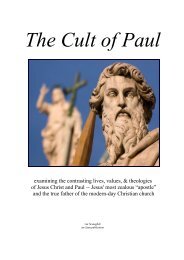Licking the Razor's Edge (2015)
Recognizing the hidden addictions that bind you, … to then set your True Self free
Recognizing the hidden addictions that bind you,
… to then set your True Self free
Create successful ePaper yourself
Turn your PDF publications into a flip-book with our unique Google optimized e-Paper software.
Addiction #25 – Freedom from NEGATIVITY<br />
“Addiction is our unconscious attempt at making things better. Alcoholics and drug<br />
addicts reach for alcohol and drugs because <strong>the</strong> ‘trip’ <strong>the</strong>y take during a high seems<br />
better than sobriety. Likewise, we’ve trained ourselves to reach for ‘negative emotions’<br />
as a way of defending against our bigger insecurities.” ~ Dr. Cherie Carter-Scott<br />
It is quite safe to say that negativity has successfully invaded our society. Our<br />
conversations are riddled with complaints and gossip, our media is laced with stories both<br />
sad and shocking, and our minds are overflowing with thoughts of hopelessness and<br />
doubt. Our modern culture has offered us <strong>the</strong> darkened lenses of woe and fear, and we<br />
have all-too-willingly put <strong>the</strong>m on.<br />
To clarify, by “negativity” I do not mean mentioning to a store manager that <strong>the</strong> product<br />
you recently purchased at her store is defective, I do not mean respectfully maintaining a<br />
personal opinion during a heated discussion with an acquaintance, and I do not mean<br />
warning ano<strong>the</strong>r person about a potential hazard to <strong>the</strong>ir health. For me, such examples<br />
aren’t “negative” – <strong>the</strong>y are communicative. The ability to discern “beneficial” from<br />
“harmful” is a valuable trait that we all possess, and it is one to be nourished. Identifying<br />
when something is broken or inconsistent or even dangerous is one thing – labeling <strong>the</strong>se<br />
things as “terrible” or “awful” or even “bad” is ano<strong>the</strong>r.<br />
In essence, what I am referring to in this chapter is <strong>the</strong> habit many of us have of<br />
complaining about <strong>the</strong> situations that don’t go our way, denigrating <strong>the</strong> people we dislike<br />
or with whom we disagree, and whining about <strong>the</strong> things we lack.<br />
I’m talking about bemoaning “bad luck” when it strikes.<br />
I’m talking about critically gossiping about our neighbors.<br />
I’m talking about complaining about “bad wea<strong>the</strong>r”.<br />
I’m talking about broadcasting our fatigue to o<strong>the</strong>rs<br />
whenever we are tired.<br />
I’m talking about watching <strong>the</strong> next catastrophe unfold on<br />
<strong>the</strong> nightly news, while numbly whispering a soft and<br />
heartless “What a shame”.<br />
I’m talking about silently rejoicing over <strong>the</strong> failures of our enemies, and<br />
melodramatically grieving <strong>the</strong> losses of our friends.<br />
These are <strong>the</strong> choices we make that are far too prevalent in our lives.<br />
These are <strong>the</strong> choices that keep us from transcending our difficulties, and <strong>the</strong>se are <strong>the</strong><br />
choices that keep us mired in lives that feel constantly “less than”.<br />
These, my Friends, are <strong>the</strong> choices that must change.<br />
165


















